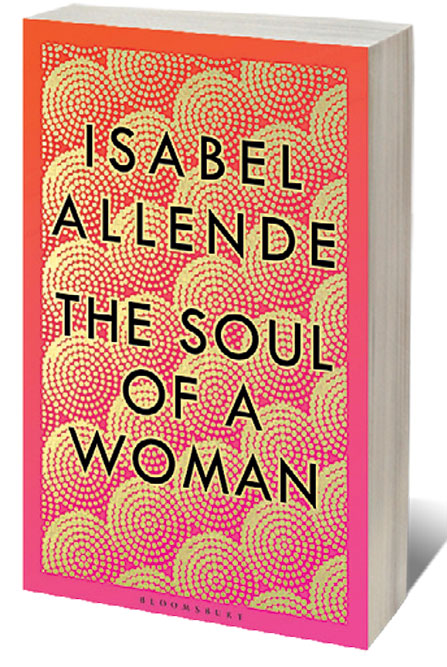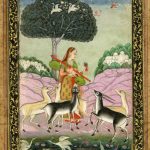‘DEFY, DISOBEY, AND disrupt is for young women who don’t have the responsibility of motherhood, and for grandmothers who are past their reproductive years,’ writes Isabel Allende in her new nonfiction book The Soul of a Woman (Bloomsbury; 192 pages; Rs 599). This three-word slogan, which has become a rallying call against patriarchy, sums up the life and work of the 78-year-old Chilean writer. Over a 40-year-career—which has birthed 20 novels and five nonfiction books—Allende has established herself as a writer who has defied cultural and gender expectations, stood up to totalitarian governments and has reordered systems. Her best-known novels include The House of the Spirits (1982), Eva Luna (1987) and the memoir about her daughter Paula (1994).
When it comes to literature, the English-speaking world knows Chile foremost for its poet Pablo Neruda and the novelist Roberto Bolaño. In 1982, when Allende’s debut novel The House of Spirits was first published, after numerous rejections, she was an aberration. She’d written the novel in the kitchen of her apartment and was suddenly tossed into the limelight. The magical realist novel tells of Clara, Blanca and Alba Trueba (mother, daughter and granddaughter). These characters, who were inspired by Allende’s own family (Clara after her grandmother and Blanca after her mother), continue to be a few of her best loved characters, whom she still calls her “guiding spirits”.
As a niece of Salvador Allende, president of Chile from 1970 to 1973, who was overthrown by General Augusto Pinochet in a coup, she lived in exile in Venezuela for 13 years. Her mother and stepfather who were on ‘wanted lists’ escaped assassination attempts. These tumultuous events moulded her into a writer and in some ways freed her from the typical diktats of domesticity. In an email interview with Open, Allende underscores this hard-won intellectual and financial freedom. “My mother was born in 1920 in a social class where young women were trained to be mothers and wives. I was born in 1942 and benefitted from the women’s liberation movement. I have been able to support myself and my children, have a career and be independent.”
As a child, Allende always felt like an outsider. She saw the world as it is, unjust and cruel. She got married at 20 and was a mother of two a few years after. Though she tried to seek out happiness as a wife and a parent, she felt like she was ‘dying of boredom’ and that her ‘brain was turning into noodle soup’. She found her creative and intellectual outlet in 1967 when she joined a newly launched feminist magazine, Paula. In an orthodox society, here was a way out; she could write about sex and reproduction, money and the laws. In the pages of the magazine and in her subsequent writing, she found an outlet for her rage against unjust systems. She says, “Rage is energy. All revolutions start with anger. The patriarchy doesn’t want change, that’s why it fears the rage of any oppressed group. The largest of those groups are women. Feminists have channelled their anger into action and have made great progress for women but there’s still a lot to be done.”
Rage is energy. All revolutions start with anger. The patriarchy doesn’t want change, that’s why it fears the rage of any oppressed group. Feminists have channelled their anger into action, says Isabel Allende, author
Share this on 

However, she realised early on that ‘anger without purpose is useless and even harmful’. She opted instead for humour as she was aware that ‘the most daring ideas can be accepted if they elicit a smile.’ It is clear that she has followed that philosophy for over four decades. She uses humour to defy, disobey and disrupt.
The Soul of a Woman, a pithy ‘autobiographical meditation on feminism, power and womanhood’, is essentially an ode to independence. Allende seamlessly weaves together her own experiences, and national and international feminist movements. As a skilled writer, she never allows the weighty subject to become a ponderous read. She writes about her husbands (she married for the third time in her 70s) and her relationships with a levity, which hindsight encourages and wisdom ensures. She never takes herself too seriously in this book, and as a reader one feels one is in the company of a particularly woke granny, with whom one can learn lessons and share laughs.
She writes about the ‘epic idiocies’ she engaged in from her 30s to her 50s, addled by ‘sexual passion’. She left her ‘good husband’ and two children for an Argentinean musician whom she happened to meet in 1976. She followed him to Spain, only to return heartbroken back to her family. On a book tour in 1987, she met a lawyer from California and moved from Caracas to be with him. She writes that she managed to ‘force him into marriage’ for reasons of a visa and paperwork. Allende details her mojo, ‘The euphemism for horny is “spontaneous,” or something to that effect. I am not spontaneous in the abstract; I need intimacy, dim light, sympathy, and marijuana. For us women, sexual passion diminishes or even disappears as we age unless we are in love. Apparently that’s not the case with men. I read somewhere, although it might be a myth, that men think about sex an average of once every three minutes, and they cling to their erotic fantasies up until their death, even if some of them can’t remember what an erection is. I wonder how they can get anything done under those circumstances.’
But behind this good humour and cheer, Allende also lays bare her frustration with inequality, whether it is about gender, class opportunity or income. In Chile, she found that the women’s movement in the ’70s was far behind the emancipation that was underway in the US and Europe. As recently as 2019, millions of people in Chile flooded the street, in an ‘explosion of populist anger’. The popular unrest reflected the fact that income inequality in Chile is among the highest in the world. Speaking in favour of these protests, Allende says, “In the 21st century we were still living under political, social and economic systems of a century ago. They are dated, they don’t represent us anymore. Young people want a better world, a different world, they feel powerless to bring about the change that is needed, that’s why they go out in the streets. I am glad it’s happening. I hope the whole world will take to the streets!” She adds, “Repressive regimes do their best to annihilate imagination, art, myths, and literature, but they never quite succeed. The human spirit survives. And so does the truth.”
I have always been aware that the world is full of violence, injustice, inequality, greed, and ugliness, but I am also aware that in my lifetime the world has changed for the better. I study the past, that makes me optimistic about the future, says Isabel Allende
Share this on 

As a feminist memoir The Soul of a Woman is also laden with accounts of love and friendships. Allende writes of her ‘Sisters of Perpetual Disorder’, a group of six friends with whom she has shared sorrows and joys over the decades. While their meetings used to be in-person, they now hangout on Zoom. Their most recent one saw them gathering with a candle and glass of champagne each to celebrate the birthday of one of the sisters. She says, “We sang happy birthday and then we talked about death: do we fear it? How are we preparing for it? Ideally how would we like to die?” The book also details her relationship with Roger, a widowed lawyer, whom she met in 2016, at the age of 74, and who is now her husband. She reassures the reader, if that is what the reader is seeking, ‘In summary, if I found a sweetheart, there’s hope for any old woman who wants a companion.’
If displacement made her a writer in her youth, I ask how this relationship has inked her work. She replies, “In my case, love gives me a sense of peace and safety in my daily life. However, most of my writing comes from my obsessions, demons and memories of childhood, when I felt lonely, unsafe, inadequate, afraid and furious.” But over time, her image of the world and herself has softened. Old age is a precious gift, she finds. She writes, ‘My brain still works. I like my brain. I feel lighter. I am free of self-doubt, irrational desires, useless complexes, and other deadly sins that are not worth the trouble. I am letting go… letting go. I should have started earlier.’
As old age makes her kinder to herself, it has also made her see the world with kinder eyes. She says, “I have always been aware that the world is full of violence, injustice, inequality, greed, and ugliness, but I am also aware that in my lifetime (I am 78) the world has changed for the better. It is not true that past times were better, they were way worse. The curve of evolution is upward. I write historical fiction, so I study the past, that makes me optimistic about the future.”
Allende has spent the pandemic at her home outside San Francisco. She is far from her country of origin and finds that she now “lives in English and writes in Spanish”. She says, “Before I start a new book, I read aloud some of Neruda’s poetry to get back the rhythm and the tone of my beautiful Spanish language.”
In her eventful life, Allende has seen and experienced much, from her father’s disappearance to the military coup in Chile, exile, her daughter Paula’s death and two divorces. Through it all her single goal has been to support herself and to do it through writing. She has succeeded at that. Her passion for life has ensured that she has remained a body in motion. She feels fortunate to have remained an outsider. She says, “Being an eternal foreigner has given me a wider vision of the world, a better understanding of people, a good ear to listen, an attentive eye to observe, a flexible nature to adapt. Most of all, it has taught me that we are but one human family. The similarities that unite us are many more than the differences that separate us. I think all that helps me in my writing.”

/wp-content/uploads/2021/03/Isabella1.jpg)

/wp-content/uploads/2025/07/Cover_Crashcause.jpg)














More Columns
Bihar: On the Road to Progress Open Avenues
The Bihar Model: Balancing Governance, Growth and Inclusion Open Avenues
Caution: Contents May Be Delicious V Shoba